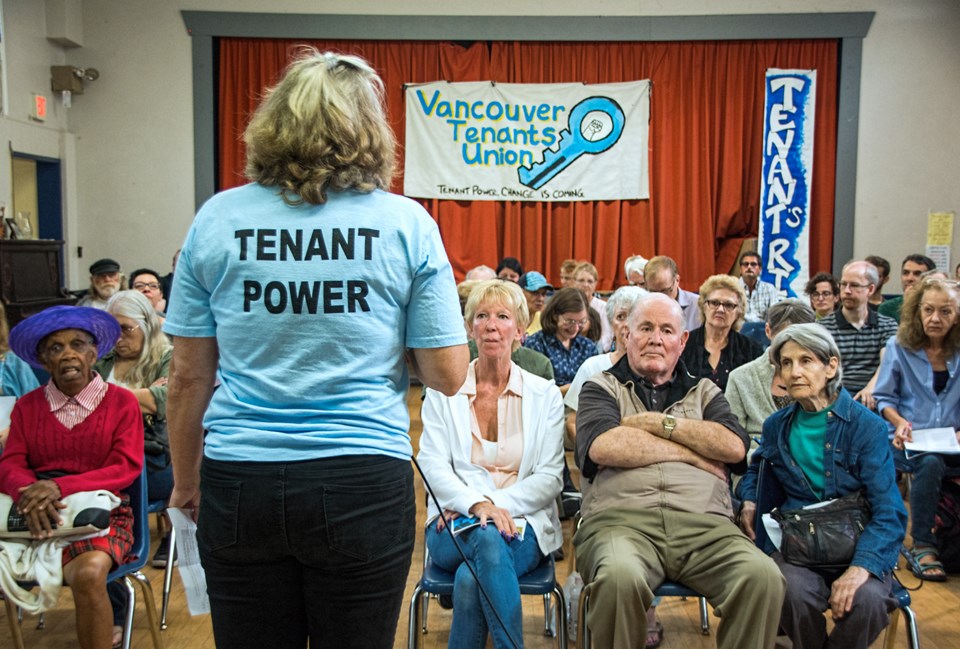New Westminster is the first city in British Columbia to apply new rental residential tenure zoning to existing rental housing stock ŌĆō much to the delight of tenantsŌĆÖ advocates and the disappointment of the development community.
Following a public hearing Monday night, council approved a zoning amendment bylaw that would add site-specific rental tenure restrictions to specific properties in the city. In addition to 12 city-owned properties that could be used for future municipal housing projects, the bylaw applies to six existing stratified buildings that have operated as rental buildings: 214 Agnes St.; 211 11th St.; 215 10th St.; 514 13th St.; 425 12th St.; and 723 12th St.
ŌĆ£Bylaw 8078 responds to the current housing crisis and the current renovictions crisis,ŌĆØ said Emilie Adin, the cityŌĆÖs director of development services. ŌĆ£The situation is that the moratorium on strata conversions cannot protect rental tenure in stratified buildings. The residential rental tenure zoning is the only city-led initiative that can be undertaken to protect rental tenure of the buildings, and housing agreements and restrictive covenants cannot be registered to title without the permission of a landowner under current provincial authorities that have been granted to the City of New Westminster.ŌĆØ
In late 2018, the city learned that a building on Ninth Street that had operated as rental since it was built in 1977 was being actively marketed for sale as condominium units.
Of the 23 people who spoke at MondayŌĆÖs two-hour public hearing, nine voiced support for the bylaw and 14 urged the city to reject the plan.
Supporters, including tenants in New Westminster buildings and representatives of the New Westminster Tenants Union, stressed the need for the retention of affordable rental units in New West. They expressed concern about the difficulty tenants have finding affordable accommodations if theyŌĆÖre renovicted or displaced from their homes in New West.
Ann Hawboldt, who rents an apartment in New Westminster, said the city could lose rental units in these buildings if the current owners decided to sell, which would result in more people on the street.
ŌĆ£New West is doing great things in this province. The whole province is watching. I hope the whole country is watching because renters like me need protection. Renters like my friends, my fellow employees, senior citizens, people on disability, we all need help,ŌĆØ she told council. ŌĆ£I think you guys are doing great. I think this bylaw is great. I am fully in support and thank you for putting in the effort.ŌĆØ
Representatives from property and development companies, Landlord BC and the Urban Development Institute were among those who voiced concerns about the cityŌĆÖs plan. They questioned the legality of the cityŌĆÖs decision to downzone their properties, the way the city is applying the rental tenure zoning and the lack of consultation before adopting the bylaw.╠²
Ally Jiwan, CEO of Redbrick Properties, said the city is unilaterally removing the rights of these property owners to have condominium tenure and not giving them anything in return. He said the rental tenure zoning should only be used as a tool to encourage new rental housing supply ŌĆō not as a penalty or preservation tool.
ŌĆ£I want to voice our extreme caution to using rental tenure zoning as you are proposing to use it. We think itŌĆÖs very draconian move the way you are proposing to use it,ŌĆØ he told council. ŌĆ£You must be careful not to downzone property value and property rights.ŌĆØ
Dana Sair, who owns Geordie Place at 723 12th St. with her two siblings, said her family built the building almost 25 years ago with assets from the family business theyŌĆÖd sold and planned to use it for their retirements. Saying the rezoning could ŌĆ£decimateŌĆØ their retirement savings, she appealed to the city to exempt the building from the rezoning.
ŌĆ£We have also paid thousands of dollars in higher taxes over the years, much more than if this was a purpose-built rental building,ŌĆØ she said. ŌĆ£It is not a building in danger of renoviction, which is understandably a major problem. Nothing will change the way it is run by simply imposing this zoning bylaw on it. We are not going to renovict anybody. We are not developers.ŌĆØ
Council unanimously supported the bylaw.
Coun. Patrick Johnstone said it would be ŌĆ£deadlyŌĆØ for him if council doesnŌĆÖt approve this rezoning and the current owners decide to sell to people who have different ideas for the buildings and tenants are displaced.
ŌĆ£As an elected official I am tired of saying, ŌĆśI canŌĆÖt do anything to help you.ŌĆÖ I am not saying this is a perfect tool; I am saying this is one tool we have. I feel if I have an opportunity to protect those 250 people I am going to take it,ŌĆØ he said. ŌĆ£We all want certainty. I know the people who own these buildings want certainty and to me right now, the crisis for certainty is people who donŌĆÖt have a place to live or are precariously living in a place where if they are evicted they will not be able to find another affordable place to live in this community. ItŌĆÖs their certainly that I am prioritizing right now with this decision.ŌĆØ
The adoption of this bylaw is a component of a larger rental housing revitalization initiative, which council endorsed on Jan. 14.╠²The city is holding an opportunity to be heard on Feb. 4 regarding proposed amendments to business regulations and licensing (rental units) bylaw to add new business licensing restrictions against renovictions.╠²
╠²
╠²
╠²
╠²
╠²



